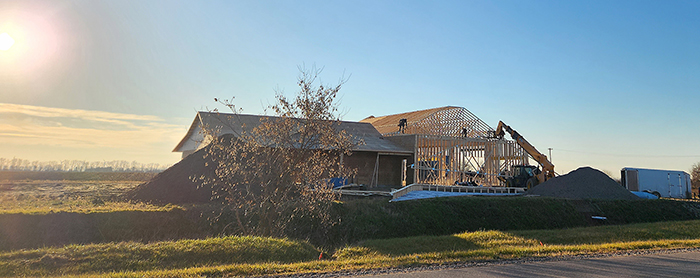
By Pam Wright
Local Journalism Initiative Reporter
A perfect storm of rising interest rates and skyrocketing inflation has led to a substantial drop in the number of building permits issued in Chatham-Kent for single family dwellings.
However, members of the Chatham-Kent Homebuilders Association are hoping a third aspect of the decrease – a $17,300 building permit fee imposed on each single-family dwelling unit in 2022 – can be renegotiated to help boost the flagging housing market.
According to municipal statistics, a total of 411 building permits were issued by Chatham-Kent in 2023 down from 528 in 2022. The biggest decrease was in permits issued for single detached dwellings, dropping from 274 in 2022 to 99 so far in 2023.
Permits issued for semi-detached dwelling units went from 82 in 2022 to 20 this year. Permits for row house dwellings also dropped to three in 2023 from 30 the previous year.
One bright spot saw apartment dwelling unit permits jump from 142 in 2022 to 289 in 2023.
As for the municipal development fee, homebuilders are hoping a compromise can be reached between the CKHBA and the municipality.
Dan Van Moorsel, executive officer of the association, recently told The Voice there’s been “some movement” on the issue. A new deal would end a stalemate between the homebuilders and C-K that began in 2022 when the municipality added the $17,300 development charge. Homebuilders, who say they were blindsided by the hike, maintain the charges were introduced without proper consultation, noting the change dealt a hefty blow to the industry.
The new fee prompted the homebuilder’s association to launch an Ontario Land Tribunal application opposing the hike, but that application is not expected to be heard until 2024.
Van Moorsel said there’s been recent” positive dialogue” between industry representatives and the municipality.
“Hopefully we can come to a solution,” Van Moorsel said, adding homebuilders are facing a challenge as the real estate market has cooled from its white-hot run a couple of years ago.
“It’s a different market,” Van Moorsel added, stressing builders are trying to again “ignite” the industry.
He points out that with 700 lots across the municipality, Chatham-Kent has plenty of available land for developers, compared to other areas that are struggling to open up development.
Developers are already responsible for paying for the infrastructure needed for new builds, including items such as sewers, roads and streetlights.
The president of the Chatham-Kent Association of Realtors, Matt Bechard, said the housing industry is currently facing challenges, and adding on $17,300 in development fees hasn’t helped.
“It’s pretty clear we’re seeing a significant decline in new development, ” Bechard said, noting the additional costs are being passed onto consumers.
The new fee is also making home building less attractive to developers, he said.
“Everything is sort of against the buyers,” Bechard added.







I would like to see scaled residential development fees based on square footage and affordability. Small affordable housing would be exempt, while oversized “investment ” properties would make up the development fee offset. So if developers want to build large investment homes then somebody will have to pay the price, but if they choose to build more small efficient and affordable homes we all benefit.